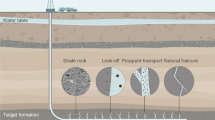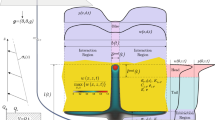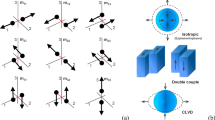Abstract
The gas permeabilities of shale fractures provide a critical basis for deeply understanding the subsurface fluid flow processes in many underground engineering activities in shales. However, the time-dependent behavior of shale permeability under formation stress has been rarely reported. In this study, two artificially fractured shale cores were used to experimentally investigate the time dependence of the fracture gas permeability and underlying mechanisms. Daily measurements of permeabilities were conducted at various gas pressures under multilevel confining stresses, where the confining stress was incrementally changed from 10 to 25 MPa and then reverted to 10 MPa. Numerical calculations were performed to determine the fracture apertures. The experimental results reveal a notable decline in gas permeability and aperture over time under each confining stress during the loading phase that proceeds from a decelerating decline stage to a steady decline stage. The gas permeability can be overestimated by at least a factor of 2 due to fracture creep. The magnitude of time-dependent permeability reduction is related to the fracture geometry, contact area, spatial distribution of apertures, and fracture stiffness. The observed significant permeability loss and limited time-dependent permeability recovery during the unloading stage indicate an irrecoverable process of creep-induced permeability reduction. The gas pressure-dependent permeability suggests notable gas slippage in fractures, which is influenced by creep and exhibits a power function decay with time. Considering the coupling effect of stress creep and gas slippage, a time-dependent gas permeability model is developed and validated using experimental data. This model is helpful to effectively predict the variation trend of fracture permeability during the implementation of underground engineering.
Highlights
-
Time-dependent variations in gas permeability of shale fractures were measured and analyzed under multilevel confining stresses.
-
Gas slippage phenomenon was observed in the fracture and decayed as a power function with time.
-
A gas permeability model of fracture that considers the coupled effects of creep compaction and gas slippage was proposed and validated against experimental data.
















Similar content being viewed by others
Data Availability
Detailed experimental data used in this study will be provided upon request.
References
An C, Killough J, Xia XY (2021) Investigating the effects of stress creep and effective stress coefficient on stress-dependent permeability measurements of shale rock. J Petrol Sci Eng 198:108155. https://doi.org/10.1016/j.petrol.2020.108155
Bachu S (2000) Sequestration of CO2 in geological media: criteria and approach for site selection in response to climate change. Energy Convers Manage 41(9):953–970. https://doi.org/10.1016/S0196-8904(99)00149-1
Bandara KMAS, Ranjith PG, Haque A, Wanniarachchi WAM, Zheng W, Rathnaweera TD (2021) An experimental investigation of the effect of long-term, time-dependent proppant embedment on fracture permeability and fracture aperture reduction. Int J Rock Mech Min Sci 144(B7):104813. https://doi.org/10.1016/j.ijrmms.2021.104813
Bandis SC, Lumsden AC, Barton NR (1983) Fundamentals of rock joint deformation. Int J Rock Mech Min Sci Geomech Abstr 20(6):249–268. https://doi.org/10.1016/0148-9062(83)90595-8
Berkowitz B (2002) Characterizing flow and transport in fractured geological media: a review. Adv Water Resour 25(8–12):861–884. https://doi.org/10.1016/S0309-1708(02)00042-8
Brown SR, Scholz CH (1985) Closure of random elastic surfaces in contact. J Geophys Res Solid Earth 90(B7):5531–5545. https://doi.org/10.1029/JB090iB07p05531
Busch A, Alles S, Gensterblum Y, Prinz D, Dewhurst DN, Raven MD, Stanjek H, Krooss BM (2008) Carbon dioxide storage potential of shales. Int J Greenhouse Gas Control 2(3):297–308. https://doi.org/10.1016/j.ijggc.2008.03.003
Cammarata G, Fidelibus C, Cravero M, Barla G (2006) The hydro-mechanically coupled response of rock fractures. Rock Mech Rock Eng 40(1):41–61. https://doi.org/10.1007/s00603-006-0081-z
Cardona A, Finkbeiner T, Santamarina JC (2021) Natural rock fractures: from aperture to fluid flow. Rock Mech Rock Eng 54(11):5827–5844. https://doi.org/10.1007/s00603-021-02565-1
Chang CD, Zoback MD (2009) Viscous creep in room-dried unconsolidated Gulf of Mexico shale (I): experimental results. J Petrol Sci Eng 69(3–4):239–246. https://doi.org/10.1016/j.petrol.2009.08.018
Chen Y-F, Zhou J-Q, Hu S-H, Hu R, Zhou C-B (2015) Evaluation of Forchheimer equation coefficients for non-Darcy flow in deformable rough-walled fractures. J Hydrol 529:993–1006. https://doi.org/10.1016/j.jhydrol.2015.09.021
Chen Y, Jiang C, Leung JY, Wojtanowicz AK, Zhang D (2020) Gas slippage in anisotropically-stressed shale: an experimental study. J Petrol Sci Eng 195:107620. https://doi.org/10.1016/j.petrol.2020.107620
Chen Y, Jiang C, Leung JY, Wojtanowicz AK, Zhang D, Zhong C (2021) Second-order correction of Klinkenberg equation and its experimental verification on gas shale with respect to anisotropic stress. J Nat Gas Sci Eng 89:103880. https://doi.org/10.1016/j.jngse.2021.103880
Chen X, Xie SY, Zhang W, Armand G, Shao JF (2022) Creep deformation and gas permeability in fractured claystone under various stress states. Rock Mech Rock Eng 55(4):1843–1853. https://doi.org/10.1007/s00603-022-02774-2
Cheng C, Milsch H (2021) Hydromechanical investigations on the self-propping potential of fractures in tight sandstones. Rock Mech Rock Eng 54(10):5407–5432. https://doi.org/10.1007/s00603-021-02500-4
Cheng PJ, Yu QC (2019) Experimental study on the relationship between the matric potential and methane breakthrough pressure of partially water-saturated shale fractures. J Hydrol 578:124044. https://doi.org/10.1016/j.jhydrol.2019.124044
Cheng PJ, Yu QC (2022) Gas slippage in microscale fractures of partially saturated shale of different matric potentials. SPE J 27(5):3020–3034. https://doi.org/10.2118/209803-pa
Cheng CJ, Herrmann J, Wagner B, Leiss B, Stammeier JA, Rybacki E, Milsch H (2021) Long-term evolution of fracture permeability in slate: an experimental study with implications for enhanced geothermal systems (EGS). Geosciences 11(11):443. https://doi.org/10.3390/geosciences11110443
Chhatre SS, Sinha S, Braun EM, Esch WL, Determan MD, Passey QR, Leonardi SA, Zirkle TE, Wood AC, Boros JA, Kudva RA (2014) Effect of Stress, Creep, and Fluid Type on Steady State Permeability Measurements in Tight Liquid Unconventional Reservoirs. In:Proceedings of the 2nd Unconventional Resources Technology Conference
Cho Y, Apaydin OG, Ozkan E (2013) Pressure-dependent natural-fracture permeability in shale and its effect on shale-gas well production. SPE Reservoir Eval Eng 16(2):216–228. https://doi.org/10.2118/159801-Pa
Danesh NN, Chen Z, Aminossadati SM, Kizil MS, Pan Z, Connell LD (2016) Impact of creep on the evolution of coal permeability and gas drainage performance. J Nat Gas Sci Eng 33:469–482. https://doi.org/10.1016/j.jngse.2016.05.033
Deng J, Zhu WY, Ma Q (2014) A new seepage model for shale gas reservoir and productivity analysis of fractured well. Fuel 124:232–240. https://doi.org/10.1016/j.fuel.2014.02.001
Deng Q, Blöcher G, Cacace M, Schmittbuhl J (2021) Hydraulic diffusivity of a partially open rough fracture. Rock Mech Rock Eng 54(10):5493–5515. https://doi.org/10.1007/s00603-021-02629-2
Elkhoury JE, Detwiler RL, Ameli P (2015) Can a fractured caprock self-heal? Earth Planet Sci Lett 417:99–106. https://doi.org/10.1016/j.epsl.2015.02.010
Gao J, Yu Q, Lu X (2017) Apparent permeability and gas flow behavior in carboniferous shale from the Qaidam Basin, China: an experimental study. Transp Porous Media 116(2):585–611. https://doi.org/10.1007/s11242-016-0791-y
Guo ZH, Vu PNH, Hussain F (2018) A laboratory study of the effect of creep and fines migration on coal permeability during single-phase flow. Int J Coal Geol 200:61–76. https://doi.org/10.1016/j.coal.2018.10.009
Hamza O, Stace R (2018) Creep properties of intact and fractured muddy siltstone. Int J Rock Mech Min Sci 106:109–116. https://doi.org/10.1016/j.ijrmms.2018.03.006
Heap MJ, Baud P, Meredith PG, Bell AF, Main IG (2009) Time-dependent brittle creep in Darley Dale sandstone. J Geophys Res. https://doi.org/10.1029/2008jb006212
Isaka BLA, Ranjith PG, Wanniarachchi WAM, Rathnaweera TD (2020) Investigation of the aperture-dependent flow characteristics of a supercritical carbon dioxide-induced fracture under high-temperature and high-pressure conditions: a numerical study. Eng Geol 277:105789. https://doi.org/10.1016/j.enggeo.2020.105789
Kaiser PK, Morgenstern NR (1982) Time-independent and time-dependent deformation of small tunnels. 3. Pre-failure behavior. Int J Rock Mech Min Sci 19(6):307–324. https://doi.org/10.1016/0148-9062(82)91366-3
Kamali-Asl A, Ghazanfari E, Perdrial N, Bredice N (2018) Experimental study of fracture response in granite specimens subjected to hydrothermal conditions relevant for enhanced geothermal systems. Geothermics 72:205–224. https://doi.org/10.1016/j.geothermics.2017.11.014
Kamali-Asl A, Ghazanfari E, Perdrial N, Cladouhos T (2020) Effects of injection fluid type on pressure-dependent permeability evolution of fractured rocks in geothermal reservoirs: an experimental chemo-mechanical study. Geothermics 87:101832. https://doi.org/10.1016/j.geothermics.2020.101832
Kamali-Asl A, Kc B, Ghazanfari E, Falcon-Suarez IH (2021) Alteration of ultrasonic signatures by stress-induced changes in hydro-mechanical properties of fractured rocks. Int J Rock Mech Min Sci 142:104705. https://doi.org/10.1016/j.ijrmms.2021.104705
Klinkenberg LJ (1941) The permeability of porous media to liquids and gases. Drill Prod Pract 1941:200–213
Li J, Chen Z, Wu K, Li R, Xu J, Liu Q, Qu S, Li X (2018) Effect of water saturation on gas slippage in tight rocks. Fuel 225:519–532. https://doi.org/10.1016/j.fuel.2018.03.186
Li B, Cui X, Zou L, Cvetkovic V (2021) On the relationship between normal stiffness and permeability of rock fractures. Geophys Res Lett 48(20):e2021GL095593. https://doi.org/10.1029/2021gl095593
Liang ZR, Chen ZX, Rahman SS (2020) Experimental investigation of the primary and secondary creep behaviour of shale gas reservoir rocks from deep sections of the Cooper Basin. J Nat Gas Sci Eng 73:103044. https://doi.org/10.1016/j.jngse.2019.103044
Liu H-H, Wei M-Y, Rutqvist J (2012) Normal-stress dependence of fracture hydraulic properties including two-phase flow properties. Hydrogeol J 21(2):371–382. https://doi.org/10.1007/s10040-012-0915-6
Liu L, Xu WY, Wang HL, Wang W, Wang RB (2016a) Permeability evolution of granite gneiss during triaxial creep tests. Rock Mech Rock Eng 49(9):3455–3462. https://doi.org/10.1007/s00603-016-0999-8
Liu ZB, Shao JF, Liu TG, Xie SY, Conil N (2016b) Gas permeability evolution mechanism during creep of a low permeable claystone. Appl Clay Sci 129:47–53. https://doi.org/10.1016/j.clay.2016.04.021
Matsuki K, Wang EQ, Sakaguchi K, Okumura K (2001) Time-dependent closure of a fracture with rough surfaces under constant normal stress. Int J Rock Mech Min Sci 38(5):607–619. https://doi.org/10.1016/S1365-1609(01)00022-3
Meng Y, Li Z, Lai F (2021) Influence of effective stress on gas slippage effect of different rank coals. Fuel 285:119207. https://doi.org/10.1016/j.fuel.2020.119207
Milne D (1990) Standardized joint descriptions for improved rock classification. In: Rock mechanics contributions and challenges. Proceedings of the 31st U.S. Symposium on Rock Mechanics. Balkema, Rotterdam
Nemoto K, Watanabe N, Hirano N, Tsuchiya N (2009) Direct measurement of contact area and stress dependence of anisotropic flow through rock fracture with heterogeneous aperture distribution. Earth Planet Sci Lett 281(1):81–87. https://doi.org/10.1016/j.epsl.2009.02.005
Nomikos P, Rahmannejad R, Sofianos A (2011) Supported axisymmetric tunnels within linear viscoelastic burgers rocks. Rock Mech Rock Eng 44(5):553–564. https://doi.org/10.1007/s00603-011-0159-0
Parsons RC, Hedley DGF (1966) The analysis of the viscous property of rocks for classification. Int J Rock Mech Min Sci Geomech Abstr 3(4):325–335. https://doi.org/10.1016/0148-9062(66)90012-X
Polak A, Elsworth D, Yasuhara H, Grader AS, Halleck PM (2003) Permeability reduction of a natural fracture under net dissolution by hydrothermal fluids. Geophys Res Lett. https://doi.org/10.1029/2003gl017575
Pyrak-Nolte LJ, Morris JP (2000) Single fractures under normal stress: the relation between fracture specific stiffness and fluid flow. Int J Rock Mech Min Sci 37(1):245–262. https://doi.org/10.1016/S1365-1609(99)00104-5
Ranjith PG, Darlington W (2007) Nonlinear single-phase flow in real rock joints. Water Resour Res 43(9):W09502. https://doi.org/10.1029/2006wr005457
Rassouli FS, Zoback MD (2018) Comparison of short-term and long-term creep experiments in shales and carbonates from unconventional gas reservoirs. Rock Mech Rock Eng 51(7):1995–2014. https://doi.org/10.1007/s00603-018-1444-y
Rathnaweera TD, Ranjith PG, Perera MSA (2015) Effect of salinity on effective CO2 permeability in reservoir rock determined by pressure transient methods: an experimental study on Hawkesbury sandstone. Rock Mech Rock Eng 48(5):2093–2110. https://doi.org/10.1007/s00603-014-0671-0
Sausse J (2002) Hydromechanical properties and alteration of natural fracture surfaces in the Soultz granite (Bas-Rhin, France). Tectonophysics 348(1–3):169–185. https://doi.org/10.1016/S0040-1951(01)00255-4
Sinha S, Braun EM, Determan MD, Passey QR, Leonardi SA, Boros JA, Wood AC, Zirkle T, Kudva RA (2013) Steady-state permeability measurements on intact shale samples at reservoir conditions—effect of stress, temperature, pressure, and type of gas. In: All Days. Bahrain International Exhibition Centre, Manama, Bahrain
Sone H, Zoback MD (2013) Mechanical properties of shale-gas reservoir rocks—Part 2: ductile creep, brittle strength, and their relation to the elastic modulus. Geophysics 78(5):D390–D399. https://doi.org/10.1190/Geo2013-0051.1
Sone H, Zoback MD (2014) Time-dependent deformation of shale gas reservoir rocks and its long-term effect on the in situ state of stress. Int J Rock Mech Min Sci 69:120–132. https://doi.org/10.1016/j.ijrmms.2014.04.002
Trzeciak M, Sone H, Dabrowski M (2018) Long-term creep tests and viscoelastic constitutive modeling of lower Paleozoic shales from the Baltic Basin, N Poland. Int J Rock Mech Min Sci 112:139–157. https://doi.org/10.1016/j.ijrmms.2018.10.013
Tsang CF, Barnichon JD, Birkholzer J, Li XL, Liu HH, Sillen X (2012) Coupled thermo-hydro-mechanical processes in the near field of a high-level radioactive waste repository in clay formations. Int J Rock Mech Min Sci 49:31–44. https://doi.org/10.1016/j.ijrmms.2011.09.015
Tse R, Cruden D (1979) Estimating joint roughness coefficients. Int J Rock Mech Min Sci Geomech Abstr 16(5):303–307
Van Noort R, Yarushina V (2018) Water, CO2 and argon permeabilities of intact and fractured shale cores under stress. Rock Mech Rock Eng 52(2):299–319. https://doi.org/10.1007/s00603-018-1609-8
Wang J, Tang D, Jing Y (2019) Analytical solution of gas flow in rough-walled microfracture at in situ conditions. Water Resour Res 55(7):6001–6017. https://doi.org/10.1029/2018wr024666
Wang C, Talandier J, Skoczylas F (2022) Swelling and fluid transport of re-sealed callovo-oxfordian claystone. Rock Mech Rock Eng 55(3):1143–1158. https://doi.org/10.1007/s00603-021-02708-4
Wanniarachchi WAM, Ranjith PG, Perera MSA, Rathnaweera TD, Zhang DC, Zhang C (2018) Investigation of effects of fracturing fluid on hydraulic fracturing and fracture permeability of reservoir rocks: an experimental study using water and foam fracturing. Eng Fract Mech 194:117–135. https://doi.org/10.1016/j.engfracmech.2018.03.009
Watanabe N, Hirano N, Tsuchiya N (2008) Determination of aperture structure and fluid flow in a rock fracture by high-resolution numerical modeling on the basis of a flow-through experiment under confining pressure. Water Resour Res 44(6):W06412. https://doi.org/10.1029/2006wr005411
Wenning QC, Madonna C, Kurotori T, Petrini C, Hwang J, Zappone A, Wiemer S, Giardini D, Pini R (2021) Chemo-mechanical coupling in fractured shale with water and hydrocarbon flow. Geophys Res Lett 48(5):e2020GL091357. https://doi.org/10.1029/2020GL091357
Witherspoon PA, Wang JSY, Iwai K, Gale JE (1980) Validity of cubic law for fluid flow in a deformable rock fracture. Water Resour Res 16(6):1016–1024. https://doi.org/10.1029/WR016i006p01016
Yasuhara H (2004) Evolution of permeability in a natural fracture: significant role of pressure solution. J Geophys Res Solid Earth. https://doi.org/10.1029/2003jb002663
Yasuhara H, Elsworth D (2008) Compaction of a rock fracture moderated by competing roles of stress corrosion and pressure solution. Pure Appl Geophys 165(7):1289–1306. https://doi.org/10.1007/s00024-008-0356-2
Yasuhara H, Polak A, Mitani Y, Grader AS, Halleck PM, Elsworth D (2006) Evolution of fracture permeability through fluid–rock reaction under hydrothermal conditions. Earth Planet Sci Lett 244(1):186–200. https://doi.org/10.1016/j.epsl.2006.01.046
Yeo IW, De Freitas MH, Zimmerman RW (1998) Effect of shear displacement on the aperture and permeability of a rock fracture. Int J Rock Mech Min Sci 35(8):1051–1070. https://doi.org/10.1016/S0148-9062(98)00165-X
Zaouter T, Lasseux D, Prat M (2018) Gas slip flow in a fracture: local Reynolds equation and upscaled macroscopic model. J Fluid Mech 837:413–442. https://doi.org/10.1017/jfm.2017.868
Zhang C-L (2013) Sealing of fractures in claystone. J Rock Mech Geotech Eng 5(3):214–220. https://doi.org/10.1016/j.jrmge.2013.04.001
Zhang C-L, Talandier J (2022) Self-sealing of fractures in indurated claystones measured by water and gas flow. J Rock Mech Geotech Eng 15(1):227–238. https://doi.org/10.1016/j.jrmge.2022.01.014
Zhang Q, Fink R, Krooss B, Jalali M, Littke R (2021) Reduction of shale permeability by temperature-induced creep. SPE J 26(2):750–764. https://doi.org/10.2118/204467-Pa
Zhao YL, Zhang LY, Wang WJ, Tang JZ, Lin H, Wan W (2017) Transient pulse test and morphological analysis of single rock fractures. Int J Rock Mech Min Sci 91:139–154. https://doi.org/10.1016/j.ijrmms.2016.11.016
Zhou J, Zhang LQ, Li X, Pan ZJ (2019) Experimental and modeling study of the stress-dependent permeability of a single fracture in shale under high effective stress. Fuel 257:116078. https://doi.org/10.1016/j.fuel.2019.116078
Acknowledgements
This work was supported by the National Natural Sciences Foundation of China (Grant Nos. 41877196, U1612441, and 41272387). The authors thank Nicholas Sitar’s constructive comments on this article.
Author information
Authors and Affiliations
Contributions
NZ: conceptualization, methodology, experiment, data processing and analysis, writing—original draft. PC: methodology, investigation, writing—review and editing. QY: conceptualization, supervision, review and editing, project administration, funding acquisition, resources.
Corresponding author
Ethics declarations
Conflict of Interest
The authors declare that they have no known competing financial interests or personal relationships that could have appeared to influence the work reported in this paper.
Additional information
Publisher's Note
Springer Nature remains neutral with regard to jurisdictional claims in published maps and institutional affiliations.
Rights and permissions
Springer Nature or its licensor (e.g. a society or other partner) holds exclusive rights to this article under a publishing agreement with the author(s) or other rightsholder(s); author self-archiving of the accepted manuscript version of this article is solely governed by the terms of such publishing agreement and applicable law.
About this article
Cite this article
Zhu, N., Cheng, P. & Yu, Q. Experimental Study on the Time-Dependent Gas Permeability of Fractures in Shales. Rock Mech Rock Eng 57, 695–718 (2024). https://doi.org/10.1007/s00603-023-03578-8
Received:
Accepted:
Published:
Issue Date:
DOI: https://doi.org/10.1007/s00603-023-03578-8




